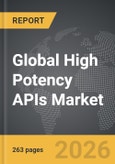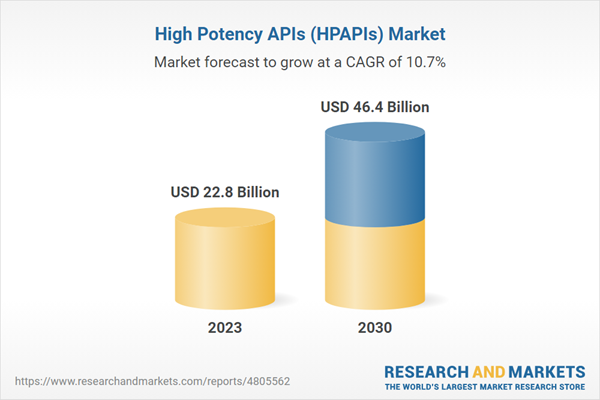Key Insights:
- Market Growth: Understand the significant growth trajectory of the Synthetic HPAPIs segment, which is expected to reach US$30.7 Billion by 2030 with a CAGR of 12%. The Biotech HPAPIs segment is also set to grow at 8.5% CAGR for the next 7-year period.
- Regional Analysis: Gain insights into the U.S. market, valued at $6.6 Billion in 2023, and China, forecasted to grow at an impressive 9.8% CAGR to reach $7.9 Billion by 2030. Discover growth trends in other key regions, including Japan, Canada, Germany, and the Asia-Pacific.
Why You Should Buy This Report:
- Detailed Market Analysis: Access a thorough analysis of the Global High Potency Active Pharmaceuticals Ingredients (HPAPIs) Market, covering all major geographic regions and market segments.
- Competitive Insights: Get an overview of the competitive landscape, including the market presence of major players across different geographies.
- Future Trends and Drivers: Understand the key trends and drivers shaping the future of the Global High Potency Active Pharmaceuticals Ingredients (HPAPIs) Market.
- Actionable Insights: Benefit from actionable insights that can help you identify new revenue opportunities and make strategic business decisions.
Key Questions Answered:
- How is the Global High Potency Active Pharmaceuticals Ingredients (HPAPIs) Market expected to evolve by 2030?
- What are the main drivers and restraints affecting the market?
- Which market segments will grow the most over the forecast period?
- How will market shares for different regions and segments change by 2030?
- Who are the leading players in the market, and what are their prospects?
Report Features:
- Comprehensive Market Data: Independent analysis of annual sales and market forecasts in US$ Million from 2023 to 2030.
- In-Depth Regional Analysis: Detailed insights into key markets, including the U.S., China, Japan, Canada, Europe, Asia-Pacific, Latin America, Middle East, and Africa.
- Company Profiles: Coverage of players such as AbbVie, Inc., Bayer AG, Boehringer Ingelheim International GmbH, Bristol-Myers Squibb Company, Eli Lilly and Company and more.
- Complimentary Updates: Receive free report updates for one year to keep you informed of the latest market developments.
Some of the 38 companies featured in this High Potency Active Pharmaceuticals Ingredients (HPAPIs) market report include:
- AbbVie, Inc.
- Bayer AG
- Boehringer Ingelheim International GmbH
- Bristol-Myers Squibb Company
- Eli Lilly and Company
- F. Hoffmann-La Roche AG
- Merck & Co., Inc.
- Mylan Pharmaceuticals, Inc.
- Novartis International AG
- Pfizer, Inc.
- Sanofi SA
- Teva Pharmaceutical Industries Ltd.
This edition integrates the latest global trade and economic shifts into comprehensive market analysis. Key updates include:
- Tariff and Trade Impact: Insights into global tariff negotiations across 180+ countries, with analysis of supply chain turbulence, sourcing disruptions, and geographic realignment. Special focus on 2025 as a pivotal year for trade tensions, including updated perspectives on the Trump-era tariffs.
- Adjusted Forecasts and Analytics: Revised global and regional market forecasts through 2030, incorporating tariff effects, economic uncertainty, and structural changes in globalization. Includes historical analysis from 2015 to 2023.
- Strategic Market Dynamics: Evaluation of revised market prospects, regional outlooks, and key economic indicators such as population and urbanization trends.
- Innovation & Technology Trends: Latest developments in product and process innovation, emerging technologies, and key industry drivers shaping the competitive landscape.
- Competitive Intelligence: Updated global market share estimates for 2025, competitive positioning of major players (Strong/Active/Niche/Trivial), and refined focus on leading global brands and core players.
- Expert Insight & Commentary: Strategic analysis from economists, trade experts, and domain specialists to contextualize market shifts and identify emerging opportunities.
Table of Contents
Companies Mentioned (Partial List)
A selection of companies mentioned in this report includes, but is not limited to:
- AbbVie, Inc.
- Bayer AG
- Boehringer Ingelheim International GmbH
- Bristol-Myers Squibb Company
- Eli Lilly and Company
- F. Hoffmann-La Roche AG
- Merck & Co., Inc.
- Mylan Pharmaceuticals, Inc.
- Novartis International AG
- Pfizer, Inc.
- Sanofi SA
- Teva Pharmaceutical Industries Ltd.
Table Information
| Report Attribute | Details |
|---|---|
| No. of Pages | 263 |
| Published | January 2026 |
| Forecast Period | 2023 - 2030 |
| Estimated Market Value ( USD | $ 22.8 Billion |
| Forecasted Market Value ( USD | $ 46.4 Billion |
| Compound Annual Growth Rate | 10.7% |
| Regions Covered | Global |









